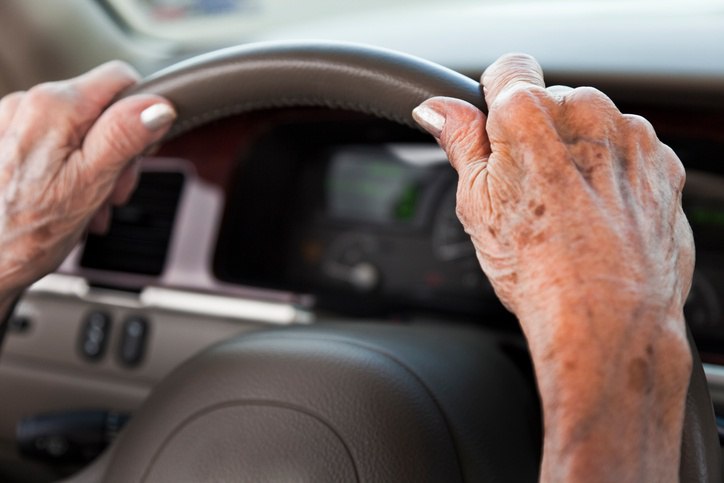
How to Tell Mom It's Time to Stop Driving
Updated from the original publication on March 18, 2021.
You love your parents. You don't want anything to happen to them. When you see your mom getting behind the wheel, you feel scared every time she heads out to run an errand. What if she misses a red light? Or doesn't hear a siren coming up behind her?
If you are feeling this way, it might be time to start a conversation about reducing her time driving. Even though the conversation may be a hard one to start, her's and other motorists' safety are of upmost importance. In this blog, we will discuss ways to start the conversation with your senior loved one about giving up driving, warning signs, health considerations and resources available to you.
Driving is largely associated with freedom. If someone came up to you today and told you that you are no longer allowed to drive to the grocery store, to your doctors appointments, to meet your friends, or anywhere at all, how would you feel?
 A 2012 survey by AAA reported that almost 90 percent of senior drivers polled said losing their license would be problematic for their lives. Imagine having to schedule everything you do around the schedule of family, a friend or public transportation. When you put this into perspective, it proves that driving truly is a freedom. That being said, it makes sense that many seniors hold onto their driving privileges as long as they possibly can and have no interest in discussing the alternative transportation solutions.
A 2012 survey by AAA reported that almost 90 percent of senior drivers polled said losing their license would be problematic for their lives. Imagine having to schedule everything you do around the schedule of family, a friend or public transportation. When you put this into perspective, it proves that driving truly is a freedom. That being said, it makes sense that many seniors hold onto their driving privileges as long as they possibly can and have no interest in discussing the alternative transportation solutions.
As your loved one ages, it is common to see a decline in driving performance. If you start to believe that it is no longer safe for your loved on to remain on the road, it is important to empathize with them and understand that giving up driving may be a very difficult thing for them to do.
To begin, it's important to know what kinds of things are red flags that show a decline in driving ability. According to the Department of Motor Vehicles, the following behaviors could be cause for concern:
- Failing to stop at signs or red lights.
- Failing to yield the right of way.
- Unsafe lane changes.
- Inability to stay in his or her lane.
- Driving too fast or slow.
- Getting lost frequently, even on common routes
- Difficulty judging distance.
Everyone can make a mistake while driving here and there, but when these behaviors become common, it is important to take note of this and take action. According to the Insurance Institute for Highway Safety, fatal crashes per mile traveled increase at about age 70 and peak at age 85 and older. While it may feel hard to approach your senior loved one about this topic, it's harder to know that your loved one may have caused an accident and injured someone because they were behind the wheel when they shouldn't have been.
Ask yourself: Would I be okay with my mom driving with an infant or a child in the car? If the answer to this question is no, immediate action should be taken.
Age related conditions play a large part in the decline in a senior's ability to drive. The following factors are things that should be considered when making the decision to decrease the amount of time your senior loved one spends behind the wheel.
- Arthritis
- Joint pain caused by arthritis can result in lowered reaction time, which is detrimental while driving.
- Stroke
- If your loved one has had or is at risk for having a stroke, driving can become a very dangerous activity. Stroke can cause sudden confusion, trouble seeing in one or both eyes, dizziness, loss of balance or coordination, etc. according to the National Stroke Association.
- Alzheimer's
- Someone with Alzheimer's disease experiences progressive mental deterioration. This condition becomes dangerous behind the wheel, as it could cause your senior loved one to confuse gas and brake pedals, forget common driving laws, have difficulty navigating places, etc.
- Medications
- Any time someone is on a medication, it is important to read all of the warnings listed on the bottle. Some medications have side effects such as dizziness or drowsiness. Medications may also have warnings against operating heavy machinery, such as a car. In addition to reading all of the warnings on your senior loved one's medications, it's important to know what kind of side effects mixing medications can cause. Someone taking any medications with the previously mentioned warnings or side effects should not be driving.
- Eye sight
- As eyes age, sight often begins to deteriorate in some way or another. To ensure that your senior loved one is seeing well enough to be behind the wheel, schedule regular eye exams. The four most common age-related eye diseases include glaucoma, cataracts, macular degeneration and diabetic retinopathy. If your senior loved one possesses any of these conditions you should proceed with extreme caution in regards to the amount of time they spend driving.
- Hearing
- Hearing loss is a very common condition among seniors. You should be cautious allowing your senior loved one with hearing loss to drive, as this could prevent them from driving successfully through high traffic areas because they could miss things such as horns and sirens that alert them to dangerous situations.
 If at all possible, the transition from driving independently to not driving at all should be a process that is planned out and happens over time. When your senior loved one starts showing even the slightest signs of declined driving performance, begin by starting a plan to slowly minimize the time they spend driving. The following are things that can be done to help transition your senior loved one from driving everywhere to giving up that part of their lives entirely:
If at all possible, the transition from driving independently to not driving at all should be a process that is planned out and happens over time. When your senior loved one starts showing even the slightest signs of declined driving performance, begin by starting a plan to slowly minimize the time they spend driving. The following are things that can be done to help transition your senior loved one from driving everywhere to giving up that part of their lives entirely:
- Minimize driving to daytime and only to places nearby
- Locate senior transportation services in your area
- Reschedule evening activities to the daytime
- Host events rather than travel to them
- See if any family or friends can assist in driving
- Carpool to events with neighbors
Don't let being a caregiver overwhelm you. For more information on managing life as a caregiver, download our eBook!



